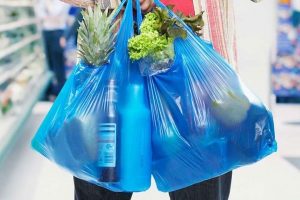THE Department of Finance (DoF) said its proposal to impose excise taxes on single-use plastic bags could yield up to P33.856 billion in the first five years of implementation.
In a statement on Monday, the DoF said that the tax measure will reduce pollution, promote sustainable practices and generate revenue to support growth.
“When a good has some negative externalities, meaning the consumption or use of a product causes some social cost, we try to regulate that through taxation,” DoF Fiscal Policy and Monitoring Group Officer-in-Charge Undersecretary Karlo Fermin S. Adriano was quoted as saying in a statement.
“In the case of single-use plastics, the social cost is mismanaged waste,” he added.
The revenue generated by this measure will be used to fund solid waste management programs for local governments.
The DoF estimates that the proposal will generate P2.334 billion in its first year of implementation, followed by P6.96 billion in the second year, P7.412 billion in the third year; P8.162 billion in the fourth year; and P8.988 billion in the fifth year.
It also noted these revenue estimates assume that the measure will be implemented as early as the third quarter with 50% tax compliance and assuming 70% tax compliance between 2025 and 2028.
For the 2025 to 2028 period, the measure is expected to yield P31.52 billion in revenue.
The DoF’s proposal imposes an excise tax of P100 per kilogram of single-use plastic bags. It is also proposing 4% annual indexation on the third year of the measure’s implementation or beginning Jan. 1, 2026.
“The proposal covers single-use plastic bags that are not recyclable, such as ‘ice’, ‘labo’, or ‘sando’ bags (with or without handles),” it said.
“Under the DoF’s proposal, the price of labo bags per piece will slightly increase from P0.47 to P0.82 while sando bags will be priced at P0.51 to P0.91 each,” it added.
The DoF said that the Philippines has one of the cheapest tax rates for single-use plastic bags compared to other countries at P0.40 per bag.
Citing World Bank data, the Philippines was found to be the third-largest contributor of mismanaged plastic in the ocean each year.
“This is a low-hanging fruit that has been on the table for more than a decade. I am confident that our legislators will support this measure,” Finance Secretary Ralph G. Recto added.
A bill seeking to impose an excise tax on plastic bags was approved by the House of Representatives in November 2022. A similar measure is pending at the Senate committee level.
The House and Senate versions likewise impose an excise tax of P100 for every kilogram of single-use plastic bags. The rate of tax is due to increase by 4% every year, effective Jan. 1, 2026.
Meanwhile, another bill pending at the Senate proposes to charge a P20 excise tax on single-use plastic bags, but also proposes 4% annual indexation. — Luisa Maria Jacinta C. Jocson
